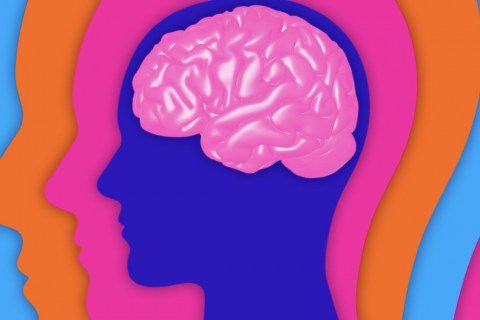

Suggestibility and the paranormal
We are aware of how much the power of suggestion can influence a person, particularly during an investigation. While we take this into account, it is the subtle suggestions that are influencing us and we don't even realise.
Our brain is always looking for meaning. It is a part of human perception. We know this from pareidolia for example. If our brain sees or even hears something that it cannot make sense of, it fills in gaps or makes it into something that we can recognise. This is why we see elephants in the clouds or faces in the steam on the shower glass. It happens audibly as well and often in jumbled noise our brain tries to make a word out to something we can understand. This same process applies to a much broader area than just what we see or hear. It is a part of almost everything that we do - including thinking. Just having a conversation with another person can completely change the way we think about something. In fact, we are influenced very easily into thinking a certain way. It is called suggestibility.
Suggestibility (The power of suggestion)
Suggestibility is considered by psychologists to be one of the many cognitive biases that affect our decision-making process. A cognitive bias is an error in the way that we think. It means we are not necessarily thinking with a 'clear mind'. Our experiences, our beliefs, and our intentions all influence the way we think, the way we make decisions, and the way we interpret our surroundings. Just the fact that we believe in the paranormal makes us biased. It means we are more prone to a self-fulfilling prophecy where our brain is likely to interpret certain things to be paranormal when they are not. We go in looking for the paranormal and our 'brain' makes us find it even if it is not really there. On the other end, a full skeptic is also biased and will tend to look for a rational explanation discounting any sort of ambiguous event without even looking into the possibility it could be something we don't quite understand. No one is immune, however applying critical thinking and taking a moment to really think things through instead of reacting or responding rashly can make a huge difference. To read more about cognitive bias, check out my article Cognitive Bias and the paranormal
Dr Myron L Fox
The book ‘Paranormality’ by Professor Richard Wiseman talks about a famous case study conducted in the 1970s at the University of Southern California. Donald Naftulin and his colleagues wanted to demonstrate the power of suggestion by writing a fake and incorrect lecture that was carefully worded on the relationship between mathematics and human behaviour. An actor was hired to deliver the talk to an audience made up of psychiatrists, psychologists and social workers. He was introduced as Dr Myron L Fox and had as much knowledge on the subject as I do - not a lot! While a script was easy for the actor to deliver for the presentation, the hardest part to pull off of course would be the 30-minute question and answer session after the talk. He had to make it seem that he knew what he was talking about. He could not anticipate the questions and would have to think on his feet which is difficult not knowing anything on the subject. He would have to somehow convince the audience that they had received the answer they were looking for while he seemed like he knew what he was talking about. The actor was coached using methods that ‘cold readers’ use such as double talk and statements that contradict themselves to answer the questions to make people believe they had received a satisfactory answer. These techniques tricked the brain into thinking it got the information it was looking for when in fact they were deliberately being deceived. After the session, a survey was given to all of the audience to complete. 95% of the people found the talk to be stimulating. 70% enjoyed the use of specific examples and 85% felt the material was presented in a very well organized way. They concluded that they successfully exposed amongst academics the brain’s ability to make something out of nothing.
I don't know about you, but I have met and also know people that are very good at talking. The phrase "they could talk their way out of a paper bag" comes to mind. Sometimes, they are so good at talking, they can fool people into thinking they know so much more than what they actually do. This is rife in the paranormal field. I have even seen and know of people that have delivered talks at conventions or do online videos and podcasts on topics that they actually know nothing about. It didn't seem to matter to most of the people watching because they were so entrailed with the delivery of the information that much like Dr Myron L Fox, they didn't realise the speaker didn't actually have any real knowledge on a topic.
Subtle suggestion
What is this symbol?

It can be interpreted as 2 different things. If I tell you that it is a B, you will see a B. If I tell you it is the number 13, that is what you will see. This is considered to be a direct suggestion, but it can also be done in a subtle way. For example, if we put an A and a C on either side of the symbol, your brain fills in the gap and interprets it as a B.

If I put a 12 and a 14 on either side of the symbol, your brain will automatically interpret it as a 13. While I am not directly telling you what it is, making subtle suggestions such as putting the letter on either side persuades your brain to go in a certain direction.
The misinformation effect
If you are a regular reader of this blog, you will know of an experiment I often refer to called "The Misinformation Effect". This experiment set out to prove that the type of questions a person is asked after an incident could actually influence the way they remember the details of the event. In this experiment, participants were shown footage of a car collision. The subjects were then asked a series of questions similar to the type of questions you would be asked by an emergency services worker after being in an accident. One of the key questions asked was "How fast were the cars going when they hit each other?". Some of the participants were asked this question, while other participants were asked "How fast were the cars going when they smashed into each other?". A very subtle difference but it is making a suggestion to your brain without you knowing it. From the study, the researchers found that by changing the word hit with the word smash, the participants remembered the footage they had seen differently. To read more about this and how it can affect the way we remember an event, check out my article False memories and the misinformation effect. The important takeaway from this particular article is seeing how easily a person can be influenced just by the way they are spoken to. The words used are key.
Suggestibility and paranormal investigating
Luckily as investigators, we are very much aware of the power of suggestion and suggestibility. I can be in a room with other people and I can stand there and start swaying. "I feel a bit uneasy and unsteady on my feet" I would say. "It is quite common for this to happen to people in this room" Soon you would see others start rocking feeling the same sensation. The group then believes something paranormal is happening. While it is a possibility, it is more likely that their brain is being influenced because I have told them that is what happens in this room. When you are aware this is happening, you can force yourself not to fall for it. But what about the little subtle suggestions I mentioned above? The way we talk to each other and the specific wording that we use when we have a conversation can have an adverse effect on how we interpret a situation. Especially after the fact. Remember the misinformation effect? Just the words we use when we talk to a person influences their recollection or how they perceive an event. This is what suggestibility is all about.
It can be really difficult when it comes to the paranormal and personal experience. Most of the time there is no data or anything solid to back it up, all you have is an experience a person has had and their word. There is no way to know if it was caused by something paranormal or if there was something else at play. What is important to know however is that the experience was very real to the person experiencing it. I wrote a little while ago about gaslighting and paranormal experiences where people are made to feel almost like they are crazy because people don't believe their paranormal experience, yet they are expected to believe another's. Whatever the cause is behind the experience is important, however, it remains unknown and is one of the many reasons paranormal investigators are searching for answers. One person's experience is not more meaningful than someone else's and ultimately, whether it happened or it was caused in part by suggestibility, the outcome remains the same. The person feels they have experienced something paranormal. Many people tend to gain an emotional attachment to their experiences because, for one reason or another, they are significant or simply light a fire of curiosity within them. When you come in and tell them, no it didn't happen you are interpreting it wrong, it isn't going to down well because you are almost saying in a nice way "it's all in your head". So what we can do is change the way that we approach our own research and investigations and that is by applying critical thinking and taking a moment to process what has happened. By understanding how easily we can be influenced, you are already on the right track.
The truth of the matter is, no one has all of the answers. All we have are our own experiences and research to guide us.
If you enjoy LLIFS, consider buying me a book (otherwise known as buy me a coffee but I don't drink coffee and I LOVE books). Your donation helps to fund the LLIFS website so everyone can continue to access great paranormal content and resources for FREE!

Top pages with similar subjects
Don't forget to follow the Facebook page for regular updates
Join the mailing list to receive weekly updates of NEW articles. Never miss an article again!
Buy the latest and past issues Haunted Magazine
Check out the books written by LLIFS